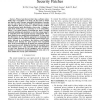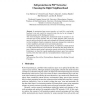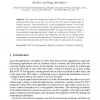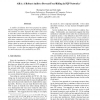138
click to vote
P2P
2010
IEEE
15 years 5 hour ago
2010
IEEE
Abstract--When a host discovers that it has a software vulnerability that is susceptible to an attack, the host needs to obtain and install a patch. Because centralized distributio...
116
click to vote
AP2PC
2005
Springer
15 years 4 months ago
2005
Springer
Since there is no method to verify the trustworthiness of shared files in P2P file sharing systems, malicious peers can spread untrustworthy files to the system. In order to pre...
132
click to vote
EURONGI
2006
Springer
15 years 5 months ago
2006
Springer
Abstract. In unstructured peer-to-peer networks, as in real life, a good neighbourhood is not only crucial for a peaceful sleep, but also for an exchange of important gossips and f...
124
click to vote
SEMWEB
2004
Springer
15 years 7 months ago
2004
Springer
P2P networks have become increasingly popular in the recent years. However, their open, distributed and anonymous nature makes them very vulnerable against malicious users who prov...
114
click to vote
ISPA
2005
Springer
15 years 7 months ago
2005
Springer
The open and anonymous nature of P2P services opens the door to malicious peers who cause the loss of trust by providing corrupted data or
ISPA
2005
Springer
15 years 7 months ago
2005
Springer
Abstract. Reputation systems help peers decide whom to trust before undertaking a transaction. Conventional approaches to reputation-based trust modeling assume that peers reputed ...
112
click to vote
WETICE
2005
IEEE
15 years 7 months ago
2005
IEEE
Since there is no method to verify the trustworthiness of shared files in P2P systems, malicious peers can spread untrustworthy files to the system. In order to prevent untrustw...
148
click to vote
P2P
2005
IEEE
15 years 7 months ago
2005
IEEE
A number of solutions have been proposed to address the free-riding problem in peer-to-peer file sharing systems. The solutions are either imperfect–they allow some users to ch...
118
click to vote
NCA
2005
IEEE
15 years 7 months ago
2005
IEEE
In distributed P2P environments, peers (i.e., users) often have to request the services from some unfamiliar peers (i.e., resources) that could be altruistic, selfish, or even ma...
141
click to vote
MIDDLEWARE
2007
Springer
15 years 8 months ago
2007
Springer
We present a flexible framework for throttling attackers in peerto-peer media streaming systems. In such systems, selfish nodes (e.g., free riders) and malicious nodes (e.g., DoS ...




